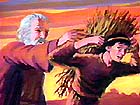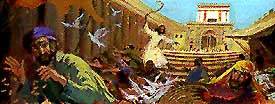“Messiah” means “Anointed One”
Biblical prophecy specialists Peter and Paul LaLonde have noted that:
Jesus Christ himself said, “For if you believed Moses, you would believe Me; for he wrote about Me” (John 5:46, NKJV). Likewise, Christ’s disciples taught that He fulfilled Old Testament prophecy (e.g., Acts 3:18; 17:2-3; 1 Corinthians 15:3-4).

Biblical prophecy specialists Peter and Paul LaLonde have noted that:
The Old Testament includes about sixty different prophecies, with more than 300 references, of the coming of the Messiah. It was through the fulfillment of these prophecies that Israel was told she would be able to recognize the true Messiah when He came. The four gospels record several times when Jesus said that He was fulfilling a prophecy of the Old Testament. Luke 24:27 records, for example,
“And beginning at Moses and all the prophets, he expounded unto them in all the scriptures the things concerning himself.” And verse 44 notes, “And he said unto them, These are the words which I spake unto you, while I was yet with you, that all things must be fulfilled, which were written in the law of Moses, and the prophets and the psalms, concerning me.” [Peter and Paul LaLonde, 301 Startling Proofs & Prophecies (Niagra Falls, Ontario, Canada: Prophecy Partners, Inc., 1996).]
Jesus Christ himself said, “For if you believed Moses, you would believe Me; for he wrote about Me” (John 5:46, NKJV). Likewise, Christ’s disciples taught that He fulfilled Old Testament prophecy (e.g., Acts 3:18; 17:2-3; 1 Corinthians 15:3-4).
Partial list of prophecies about the Messiah

Click to learn the story of Moses in our God’s Story section.
- A prophet like unto Moses. This was prophecied by Moses, himself:
“The LORD your God will raise up for you a Prophet like me from your midst, from your brethren. Him you shall hear, according to all you desired of the LORD your God in Horeb in the day of the assembly, saying, ‘Let me not hear again the voice of the LORD my God, nor let me see this great fire anymore, lest I die.’ And the LORD said to me: ‘What they have spoken is good. I will raise up for them a Prophet like you from among their brethren, and will put My words in His mouth, and He shall speak to them all that I command Him. And it shall be that whoever will not hear My words, which He speaks in My name, I will require it of him’.” (Deuteronomy 18:15-19, NKJV).
Like Moses, the Messiah would be a leader, a prophet, a lawgiver, a deliverer, a teacher, a priest, an anointed one, a mediator, a human and one of God’s chosen people (a Jew) performing the role of intermediary between God and man—speaking the words of God—and like Moses, the Messiah would offer himself to die for the sins of the people. Both Moses and Jesus performed many miracles validating their message. As infants, both their lives were threatened by evil kings, and both were supernaturally protected from harm. Both spent their early years in Egypt. Both taught new truths from God. Both cured lepers (Num 12:10-15; Matt. 8:2-3) and confronted demonic powers. Both were initially doubted in their roles by their siblings. Moses lifted up the brazen serpent to heal all his people who had faith; Jesus was lifted up on the cross to heal all who would have faith in Him. Moses appointed 70 elders to rule Israel (Num. 11:16-17); Jesus appointed 70 disciples to teach the nations (Luke 10:1, 17). And there are many other parallels between the lives of Moses and Jesus. - The Messiah would be a descendant of Noah’s son, Shem. Noah said, “Blessed be the LORD God of Shem; and Canaan shall be his servant. God shall enlarge Japheth, and he shall dwell in the tents of Shem; and Canaan shall be his servant (Gen. 9:26-27). Chapter 10 goes on list descendants of Shem, noting that he was ancestor of Eber (Heber: Luke 3:35), the founder of the Hebrew race.
Noah associated Shem especially with the worship of Jehovah, recognizing the dominantly spiritual motivations of Shem and thus implying that God’s promised Deliverer would ultimately come from Shem. The Semitic nations have included the Hebrews, Arabs, Assyrians, Persians, Syrians and other strongly religious-minded peoples.
…Shem was peculiarly His [God’s] steward with respect to the propagation of God’s will and plan for mankind, especially the transmission of His saving Word. (Henry M. Morris, The Defender’s Bible) - More specifically, he would be a descendant of Shem named Abraham ( Genesis 22:18; 12; 17; 22). Fulfilled: See Christ’s genealogy in Matthew 1.
- More specifically, he would be a descendant of Abraham’s son, Isaac, not Ishmael (Gen. 17; 21). Fulfilled: See Christ’s genealogy in Matthew 1.
 Click to learn more about the Abraham and Isaac in our God’s Story section.
Click to learn more about the Abraham and Isaac in our God’s Story section. - More specifically, he would be a descendant of Isaac’s son, Jacob, not Esau (Gen. 28; 35:10-12; Num. 24:17). Fulfilled: See Christ’s genealogy in Matthew 1.
- More specifically, he would be a descendant of Judah, not of the other eleven brothers of Jacob. Fulfilled: See Christ’s genealogy in Matthew 1.
- More specifically, he would be a descendant of the family of Jesse in the tribe of Judah (Isaiah 11:1-5). Fulfilled: See Christ’s genealogy in Matthew 1 and Luke 3:23-38.
- More specificially, he would be of the house of David (2 Samuel 7:12-16; Jeremiah 23:5; Psalm 89:3-4). Fulfilled: See Christ’s genealogy in Matthew 1; Luke 1:27, 32, 69. Note: Since the the Jewish genealogical records were destroyed in 70 A.D., along with the destruction of Jerusalem and the Temple, it would not be possible for a Messiah imposter who was born later to prove his lineage back to David and thus fulfill this prophecy.
- He will be born in a small city called Bethlehem, specifically the one formerly known as Ephratah (Micah 5:2). Fulfilled: Luke 2:4-20. Note: Christ’s birth in Bethlehem was apparently not by the choice of Mary and Joseph; it was forced upon them by Caesar Augustus’ taxation decree which required Joseph to leave his home in the city of Nazareth and return to his place of origin to pay the tax.
- He will be born of a virgin (Isaiah 7:14). Fulfilled: Matthew 1; Luke 1.
- The Messiah would be the “seed of of a woman” come to destroy the work of the Devil. Not long after Creation, God prophecied to the serpent Satan, “And I will put enmity between you and the woman, And between your seed and her Seed; He shall bruise your head, And you shall bruise His heel” (Genesis 3:15). The implication was that Eve’s descendant would undo the damage that Satan had caused.
The “seed of the woman” can only be an allusion to a future descendant of Eve who would have no human father. Biologically, a woman produces no seed, and except in this case Biblical usage always speaks only of the seed of men. This promised Seed would, therefore, have to be miraculously implanted in the womb. In this way, He would not inherit the sin nature which would disqualify every son of Adam from becoming a Savior from sin. This prophecy thus clearly anticipates the future virgin birth of Christ.
In the New Testament, Christ’s apostle John confirms that this was His Master’s purpose, “He who does what is sinful is of the devil, because the devil has been sinning from the beginning. The reason the Son of God appeared was to destroy the devil’s work” (1 John 3:8). (Also see: Hebrews 2:14; Revelation 20:10.)
Satan will inflict a painful wound on the woman’s Seed, but Christ in turn will inflict a mortal wound on the Serpent, crushing his head. This prophecy was fulfilled in the first instance at the cross, but will culminate when the triumphant Christ casts Satan into the lake of fire (Revelation 20:10).
This primeval prophecy made such a profound impression on Adam’s descendants that it was incorporated, with varying degrees of distortion and embellishment, in all the legends, mythologies and astrologies of the ancients since they are filled with tales of mighty heroes engaged in life-and-death struggles with dragons and other monsters. Mankind, from the earliest ages, has recorded its hope that someday a Savior would come who would destroy the devil and reconcile man to God. (Henry M. Morris, The Defender’s Bible) - He will be a priest after the order of Melchisedek (Melchisedec) (Psalm 110:4). Fulfilled: Hebrews 5:6
- The scepter shall not pass from the tribe of Judah until the Messiah comes. In other words, He will come before Israel loses its right to judge her own people. The patriarch Jacob prophecied this:
The sceptre shall not depart from Judah, nor a lawgiver from between his feet, until Shiloh come; and unto him shall the gathering of the people be. (Genesis 49:10)
As Dr. Henry M. Morris’ The Defender’s Bible explains:
This important prophecy has been strikingly fulfilled. Although Judah was neither Jacob’s firstborn son nor the son who would produce the priestly tribe, he was the son through whom God would fulfill His promises to Israel and to the world. The leadership, according to Jacob, was to go to Judah, but this did not happen for over 600 years. Moses came from Levi, Joshua from Ephraim, Gideon from Manasseh, Samson from Dan, Samuel from Ephraim and Saul from Benjamin. But when David finally became king, Judah held the scepter and did not relinquish it until after Shiloh came. “Shiloh” is a name for the Messiah, probably related to the Hebrew word for “peace” (shalom) and meaning in effect, “the one who brings peace.”
According to the Jewish historian Josephus, the Sanhedrin of Israel lost the right to truly judge its own people when it lost the right to pass death penalties in 11 A.D. (Josephus, Antiquities, Book 17, Chapter 13). Jesus Christ was certainly born before 11 A.D. - He will come while the Temple of Jerusalem is standing ( Malachi 3:1; Psalm 118:26; Daniel 9:26; Zechariah 11:13; Haggai 2:7-9). Fulfilled: Matthew 21:12, etc. (Note: The Temple did not exist at certain periods in Jewish history, and it was finally destroyed in 70 A.D.)
